2025年安徽中考英语 第一部分 话题6 人际交往课件【通用版】
文档属性
| 名称 | 2025年安徽中考英语 第一部分 话题6 人际交往课件【通用版】 |  | |
| 格式 | ppt | ||
| 文件大小 | 914.5KB | ||
| 资源类型 | 试卷 | ||
| 版本资源 | 通用版 | ||
| 科目 | 英语 | ||
| 更新时间 | 2025-02-27 16:53:57 | ||
图片预览

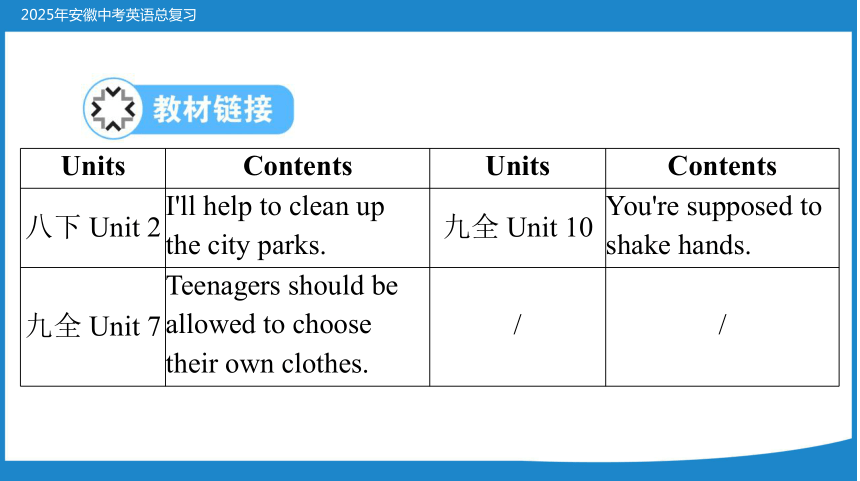
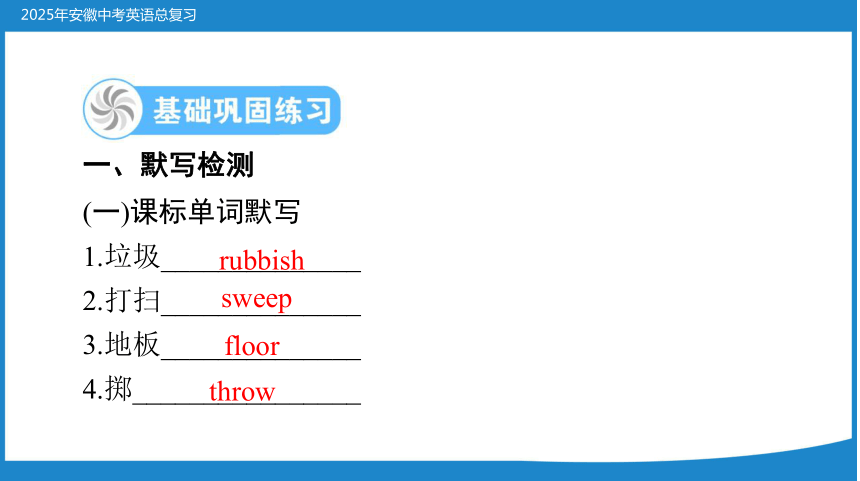
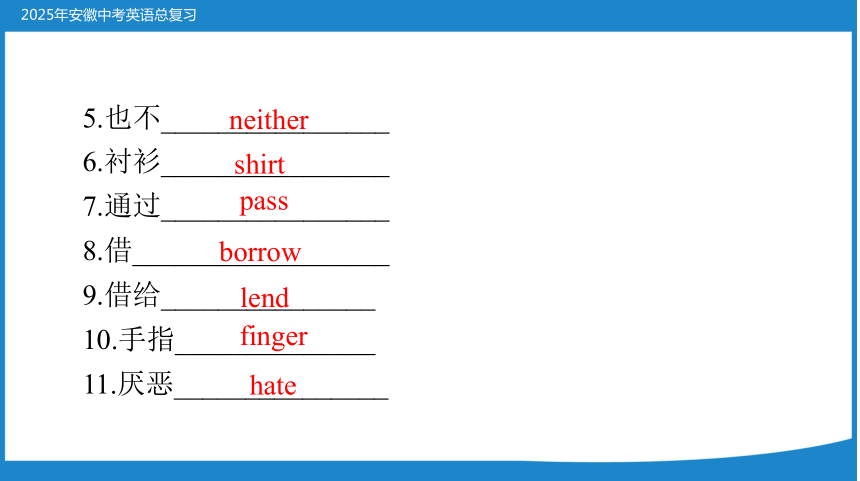
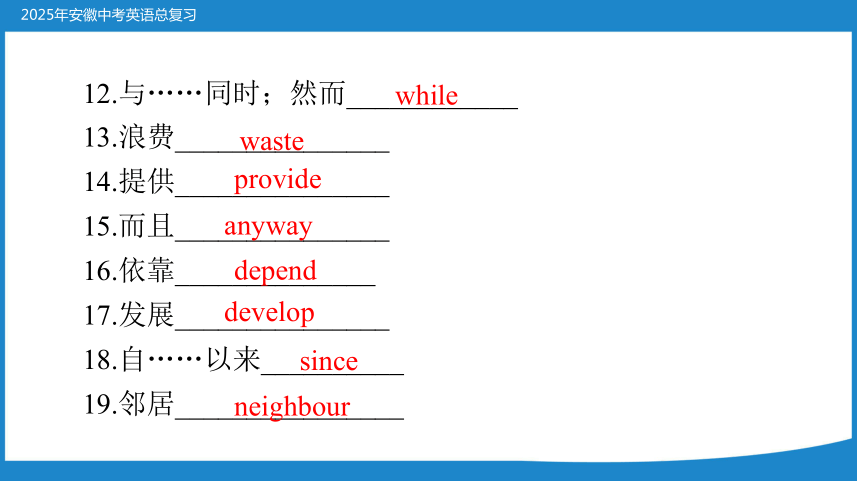
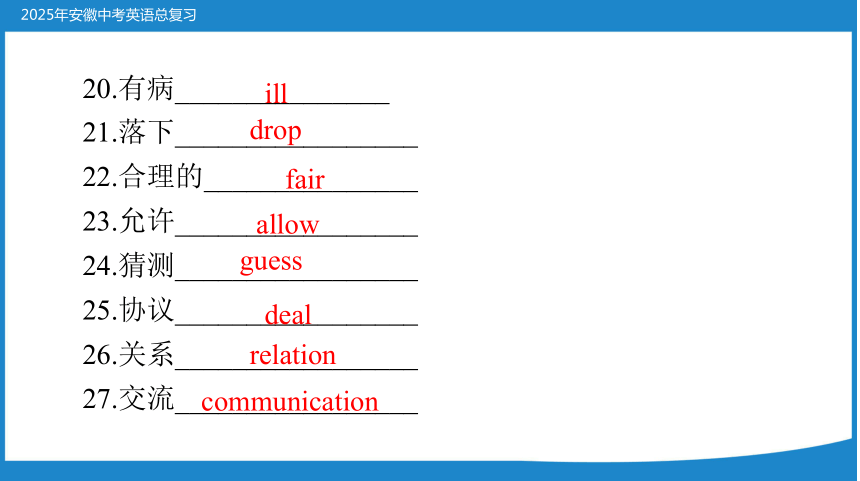
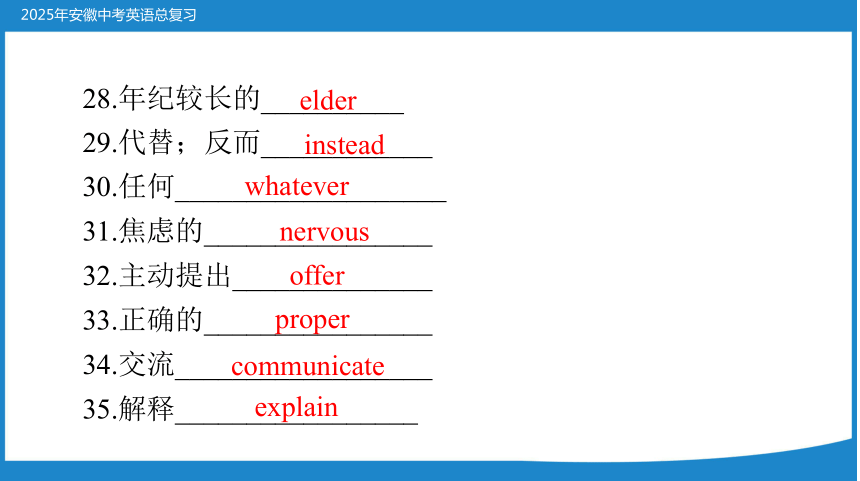
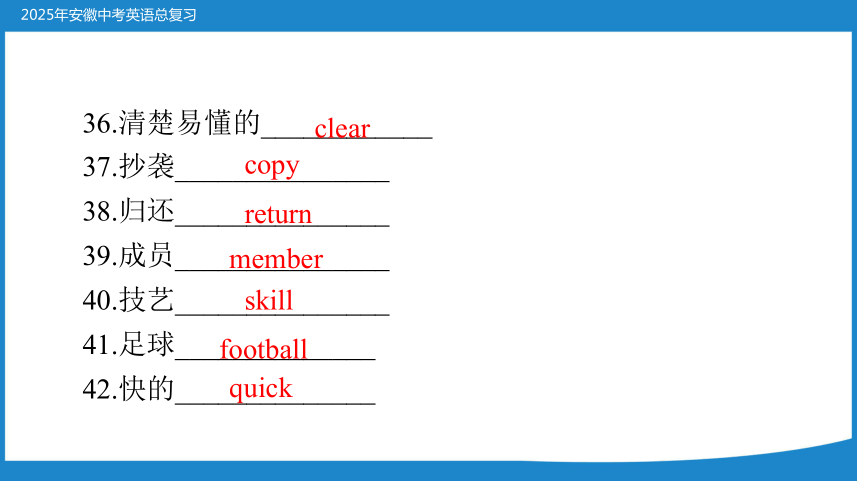
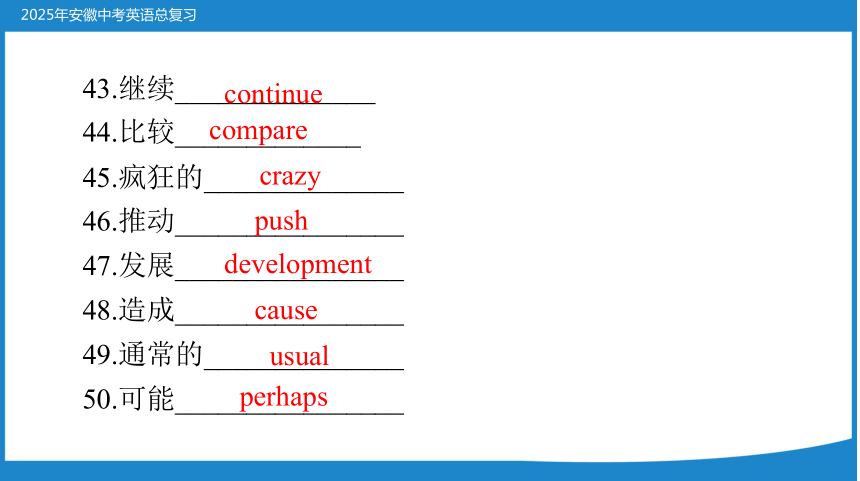
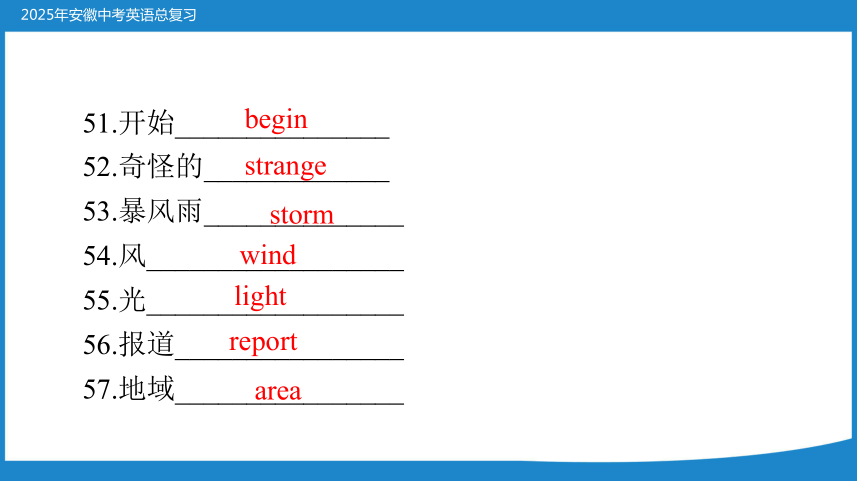
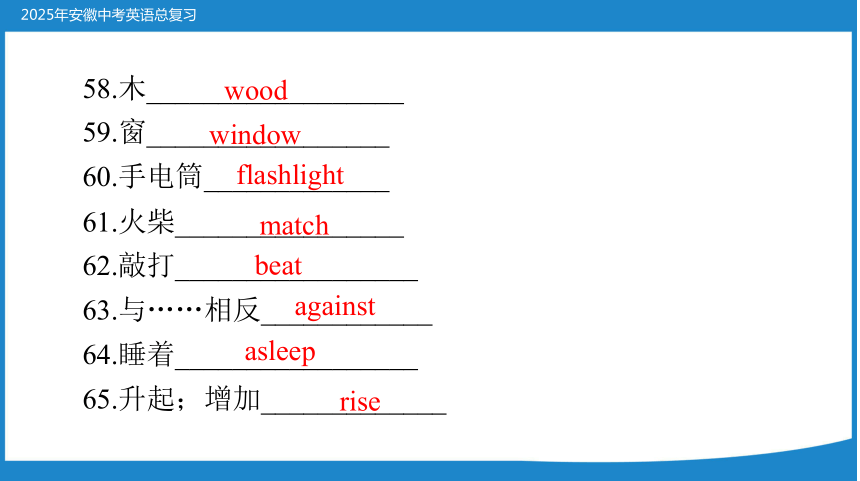
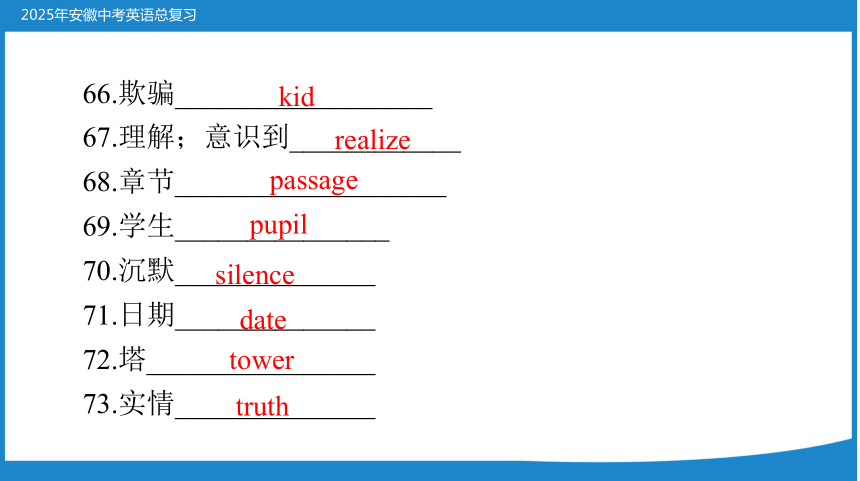
文档简介
(共55张PPT)
话题 6
人际交往
课标子主题:良好的人际关系与人际交往;跨文化沟通与交流
第一部分 教材话题整合
Units Contents Units Contents
八下 Unit 2 I'll help to clean up
the city parks. 九全 Unit 10 You're supposed to
shake hands.
九全 Unit 7 Teenagers should be
allowed to choose
their own clothes. / /
一、默写检测
(一)课标单词默写
1.垃圾______________
2.打扫______________
3.地板______________
4.掷________________
rubbish
sweep
floor
throw
5.也不________________
6.衬衫________________
7.通过________________
8.借__________________
9.借给_______________
10.手指______________
11.厌恶_______________
neither
shirt
pass
borrow
lend
finger
hate
12.与……同时;然而____________
13.浪费_______________
14.提供_______________
15.而且_______________
16.依靠______________
17.发展_______________
18.自……以来__________
19.邻居________________
while
waste
provide
anyway
depend
develop
since
neighbour
20.有病_______________
21.落下_________________
22.合理的_______________
23.允许_________________
24.猜测_________________
25.协议_________________
26.关系_________________
27.交流_________________
ill
drop
fair
allow
guess
deal
relation
communication
28.年纪较长的__________
29.代替;反而____________
30.任何___________________
31.焦虑的________________
32.主动提出______________
33.正确的________________
34.交流__________________
35.解释_________________
elder
instead
whatever
nervous
offer
proper
communicate
explain
36.清楚易懂的____________
37.抄袭_______________
38.归还_______________
39.成员_______________
40.技艺_______________
41.足球______________
42.快的______________
clear
copy
return
member
skill
football
quick
43.继续______________
44.比较_____________
45.疯狂的______________
46.推动________________
47.发展________________
48.造成________________
49.通常的______________
50.可能________________
continue
compare
crazy
push
development
cause
usual
perhaps
51.开始_______________
52.奇怪的_____________
53.暴风雨______________
54.风__________________
55.光__________________
56.报道________________
57.地域________________
begin
strange
storm
wind
light
report
area
58.木__________________
59.窗_________________
60.手电筒_____________
61.火柴________________
62.敲打_________________
63.与……相反____________
64.睡着_________________
65.升起;增加_____________
wood
window
flashlight
match
beat
against
asleep
rise
66.欺骗__________________
67.理解;意识到____________
68.章节___________________
69.学生_______________
70.沉默______________
71.日期______________
72.塔________________
73.实情______________
kid
realize
passage
pupil
silence
date
tower
truth
74.石头_____________
75.虚弱的____________
76.神_________________
77.一点_________________
78.愚蠢的______________
79.隐藏________________
80.尾巴_________________
stone
weak
god
bit
silly
hide
tail
81.有魔力的_____________
82.棍___________________
83.使激动________________
84.西方国家的______________
85.适合________________
86.夫妻________________
87.笑__________________
magic
stick
excite
Western
fit
couple
smile
88.结婚_______________
89.金子________________
90.丝绸________________
91.没有人______________
92.愚蠢的______________
93.欺骗_______________
94.妻子_______________
95.丈夫_______________
marry
gold
silk
nobody
stupid
cheat
wife
husband
96.全部的______________
97.照耀_________________
98.光亮的________________
99.地面__________________
100.带路________________
101.声音________________
102.勇敢的______________
whole
shine
bright
ground
lead
voice
brave
(二)重点短语默写
1.倒垃圾____________________
2.频繁;反复________________
3.一……就……________________
4.目的是;为了________________
5.依靠;信赖________________
6.哪儿不舒服?________________
7.快速查看;浏览________________
take out the rubbish
all the time
as soon as
in order to
depend on
What's wrong
look through
8.重要的事________________
9.成功地发展;解决________________
10.和睦相处;关系好________________
11.删除;删去________________
12.比较;对比________________
13.依……看________________
14.(闹钟)发出响声________________
cut out
compare…with
in one's opinion
go off
big deal
work out
get on with
15.用手拿起(某物)________________
16.进入梦乡;睡着________________
17.逐渐变弱;逐渐消失______________
18.看一看________________
19.前往;费力地前进________________
20.沉默;无声________________
21.拆除;往下拽;记录______________
pick up
fall asleep
die down
have a look
make one's way
in silence
take down
22.首先;最初________________
23.有点儿;稍微________________
24.代替;反而________________
25.变成________________
26.从前__________________
27.爱上;喜欢上________________
28.结婚________________
a little bit
instead of
turn…into
once upon a time
fall in love
get married
at first
二、语法考点聚焦
1.Tony, could you please help out with a few things?托尼,你可
以帮着做几件事吗?
[辨析]a few、few、a little 与 little
①a few 意为 “少数;几个”,修饰可数名词复数,表肯定。
例如:
He left his house a few minutes ago.他几分钟前离开了家。
②few 意为 “几乎没有;很少”,修饰可数名词复数,表否
定。例如:
There are few vegetables in the fridge.Let's go and buy some. 冰
箱里几乎没有蔬菜了,我们去买一些吧。
③a little 意为 “一点;少许”,修饰不可数名词,表肯定。
例如:
Could you lend me a little money 你能借我一点钱吗?
④little 意为 “几乎没有;很少的”,修饰不可数名词,表否
定。例如:
A
There was little rain all year round.整个一年几乎没下雨。
练习:(
know her.
A.few
C.little
)The girl in pink is new here, so ________ people
B.a few
D.a little
2.For one week, she did not do any housework and neither did I.
一个星期,她没做家务活,我也没做。
[解释]“neither+be 动词/助动词/情态动词+主语”构成否定
的倒装句,表示 “……也不”。例如:
He doesn't like swimming and neither do I.他不喜欢游泳,我也
不喜欢。
If he doesn't go to the party, neither will they. 如果他不参加聚
会,他们也不会去。
[拓展]①“so+be 动词/助动词/情态动词+主语”构成肯定的
倒装句,表示 “……也”。例如:
I can speak French, so can he.我会讲法语,他也会。
②neither 作代词,意为 “(两者)都不”。例如:
Neither of my parents is at home.我父母都不在家。
③neither 作形容词,与名词单数连用,意为 “(两者)都不”。
例如:
Neither answer is right.两个答案都不对。
④neither...nor...意为 “既不……也不……”,连接两个并列
主语时,谓语动词要依据就近原则确定形式。例如:
A
Neither I nor he joins the art club.我和他都没参加美术俱乐部。
练习:(
)I can't play the piano, and ________.
A.neither can my sister
B.so can't my sister
C.my sister can't, too
D.can my sister, either
3.Could you lend me some money 你能借我一些钱吗?
[辨析] borrow、lend 与 keep
①borrow 意为 “借进;借入”,非延续性动词,常构成短语
borrow sth.from sb.。例如:
He borrowed some books from the library last month. 他上个月
从图书馆借了一些书。
②lend 意为 “借给;借出”,常构成短语 lend sb.sth.和 lend
sth.to sb.。例如:
You can't lend my dictionary to others. 你不能把我的字典借给
别人。
③keep 意为 “保持;保存”,延续性动词,通常和一段时间
连用。例如:
B
—How long can I keep the book?我能把这本书借多久?
—You can keep it for two weeks.你能借两周。
练习:(
)—Can I ________ your bike
—With pleasure.But you mustn't ________ it to others.
A.lend; borrow
C.lend; keep
B.borrow; lend
D.keep; lend
4.They should spend their time on schoolwork in order to get
good grades and get into a good university.为了取得好成绩,进入一
所好的大学,他们应当把时间花在学业上。
[辨析] spend、pay、take 与 cost
①spend(spent, spent)作及物动词,意为 “花费”, 指花费时
间、金钱或精力,主语通常是 “人”,常用结构为 sb.spends
time/money on sth.或 sb.spends time/money (in) doing sth.。例如:
He spent 3 years writing the book.他花了 3 年时间写了那本书。
②pay(paid, paid)意为 “支付; 花费”,指支付金钱,主语
通常是 “人”,常用结构为 sb.pays (sb.) money for sth.。She paid a
lot of money for the new house.她花了很多钱买那座新房子。
③take 意为 “花费”,指花费时间,常用结构为 it takes/took
sb.time to do sth., it 为形式主语。
It took him a few weeks to finish reading the book. 读完这本书
花了他几周的时间。
④cost 意为 “花费”,指花费金钱、精力等。主语为 “物”,
常用结构为 sth.costs (sb.) money。
His hobbies cost him a lot of money.爱好花了他很多钱。
练习:(
)Now parents are ________ more and more money
on their children's education.
D
A.taking
B.paying
C.costing
D.spending
5.It is the parents' job to provide a clean and comfortable
environment at home for their children.给孩子们在家里提供一个干
净又舒适的环境是父母的责任。
[解释]provide 为及物动词,意为 “提供;供给”,
[辨析] provide sth.for sb.或 provide sb.with sth.,意为 “为某人
提供某物”。
He has to provide food and clothes for his family.他得养家糊口。
The country provides students with free lunch. 国家为学生提供
免费午餐。
练习: (
)To protect the environment, supermarkets don't
________ free plastic bags for shoppers.
B
A.offer
C.carry
B.provide
D.take
6.You left your homework at home.你把家庭作业忘在家里了。
[辨析] leave 与 forget
leave 意为 “离开;留下,剩下; 遗留,落下”。It's time for
us to leave.我们该走了。There is little time left.Hurry up! 没有时间
了。快点儿! She left her bag at school.她把包忘在学校了。
forget 意为 “忘记”,指由于记忆上的忽略而忘记某人或某
事。I forgot his number.我忘了他的号码。
C
练习:(
)—Show me your homework, Dave.
—Sorry, Mrs Brown.I've ________ it at home.
A.missed
B.lost
C.left
D.forgotten
7.And they are always comparing them with other children.并且
她们总是把他们和别的孩子对比。
[解释]compare 作及物动词,意为 “比较;对比”。
[辨析]compare...with...意为 “把……与……比较”,常用于
两个同类事物之间,着重区别。
Compare this picture with that one and find the differences.比较
这两幅图画并找出不同点。
compare...to...意为 “把……比作……”,常用于两个不同性
质的事物比较。
We often compare children to flowers. 我们经常把孩子比作花
朵。
compare
to
练习:我们经常把孩子比作七八点钟的太阳。
We often _________ children ________ the sun at seven or eight.
8.So while you were sleeping, I called Jenny and she helped me.
因此当你在睡觉的时候,我给珍妮打了电话,她帮了我。
[辨析] while 与 when
此处 while 作从属连词,意为 “当……的时候,在……期间;
一边……一边……,与此同时”,引导时间状语从句,其谓语动
词必须为延续性动词,常用于过去进行时态中。
He fell asleep while he was watching TV.他在看电视时睡着了。
While we were talking, he came in.我们在谈话时,他进来了。
when 意为 “当……的时候”,其谓语动词可以是延续性动
词,也可以是非延续性动词。也可表示在一个长时间动作发生的
过程中,突然发生另一个动作,含有 “突然”之意。
I was sleeping when someone knocked at the door.我在睡觉,突
然有人敲门。
[拓展]while 与 when 在过去进行时中位置的转换:
While John was taking photos, Mary bought a drink. =John was
taking photos when Mary bought a drink.
D
练习:(
cooking.
A.until
C.after
)Tom rushed into the house ________ his mother was
B.before
D.while
9.Ben was helping his mum making dinner when the rain began
to beat heavily against the windows.当雨开始猛烈地敲打窗户时,本
在帮助妈妈做晚饭。
[解释]①beat(beat, beaten)作不及物动词,意为 “敲打;(风雨
等)冲击;(心脏等)跳动”。例如:
Someone was beating on the door.有人在敲门。
[拓展]beat 作及物动词,意为 “打;敲;锤砸;打败”。He
always beats me in tennis.他总是在网球方面打败我。beat 表示 “打
败”,后通常接 “人”;win 表示 “赢”,后通常接 “比赛项
目”。
is beating
beat
练习:(1)My heart ____________ quickly.我的心怦怦直跳。
(2)We ____________ them by 3∶2.我们以 3 比 2 打败了他们。
[解释]② against 作介词,意为 “倚;靠;碰撞;反对;违反
等”。例如:
He is standing against the wall.他靠墙而立。
They are going to play against Class 3.他们将和 3 班对抗比赛。
练习:(3)People _____________ smoking in public.人们反对在
公共场合抽烟。
are against
10.I was so scared that I could hardly think clearly after that.我是
那么害怕以至于我都不能清楚地想象那之后的事。
[辨析] hardly 与 hard
①hardly 作副词,意为 “几乎不”,用在句中表否定。He
hardly watches TV.他几乎不看电视。
②hard 作形容词,意为 “难的;硬的”;作副词,意为 “努
力地;辛苦地;猛烈地”。
She found it hard to decide.她发现难以决定。
Everyone should work hard.每人都应该努力学习。
练习:(1)(
go out to play.
A.hard; hardly
)It's raining so _______ that people can ________
B.hard; hard
C.hardly; hardly
D.hardly; hard
A
[拓展]so...that...意为 “如此……以至于……”,引导结果状语
从句。
He is so clever that he can work out the problem easily.= He is
such a clever boy that he can work out the problem easily.他是如此聪
明以至于他能很容易地算出那道题。
so that 意为 “以便于……;为了……”,引导目的状语从句,
通常和情态动词 can、could 连用。
练习:(2)他起得早以便于能赶上早班车。
He got up early ____________ he could catch the early bus.
(3)她气得一句话也说不出来。___________________________
She was so angry that she
__________________________
so that
couldn't say a word.
11.As soon as the man finished talking, Yu Gong said that his
family could continue to move the mountains after he died. 那人一说
完,愚公就说,他死后他的家人将继续移山。
[解释]finish 此处为及物动词,意为 “完成”,后接名词、代
词或动名词作宾语。
He always finishes (doing) his homework before supper. 他总是
在晚饭前完成他的家庭作业。
[拓展]只能用动名词形式作宾语的常见的动词及短语有:
enjoy doing sth.喜欢做某事;practice doing sth.练习做某事;keep (on)
doing sth.一直做某事;mind doing sth.介意做某事;be busy doing sth.
忙于做某事;have fun doing sth.高兴做某事;feel like doing sth.想
要做某事;look forward to doing sth.盼望做某事;can't help doing sth.
)May I have a rest I have already finished ________
禁不住做某事
练习:(
the report.
A.write
B.writing
C.to write
D.written
B
12.But what could Yu Gong do instead of moving the
mountains?但是不把山移走,愚公还能做什么呢?
[辨析] instead 与 instead of
①instead 作副词,意为 “代替;反而;却”,修饰整个句子,
位于句首或句末。
②instead of 意为 “代替;而不是”,后面跟名词、代词或动
名词。
练习:(1)他病了,所以我将接替他的位置。He is ill, so I will
take his place _________.
instead
instead of
(2)我们来下国际象棋,不看电视了。Let's play chess _________
watching TV.
13.Nobody wanted to sound stupid.没人想听起来愚蠢。
[解释]sound 此处作连系动词,意为 “听起来”,其后常跟形
容词作表语。
A
[辨析]常见短语 sound like “听起来像……”,后跟名词。
The story sounds very interesting.这个故事听起来很有趣。
That sounds like a good idea.那听起来是个不错的主意。
[拓展]常见“感觉”类连系动词有:look(看起来), smell(闻起
来), taste(尝起来), sound(听起来), feel(感觉;摸上去)
练习:(
)He likes food which ________ good.
A.looks
B.taste
C.sound
D.felt
14.Maybe it was eaten by the birds.可能让鸟给吃了。
[解释]maybe 此处作为副词,意为 “也许;可能”,在句中
作状语,相当于 perhaps,常用于句首。
[辨析]①may be 中 may 是情态动词,be 是动词原形,两者构
成完整的谓语形式,意为 “也许是;可能是”。He may be at home.
他可能在家。
②maybe 和 may be 可相互转换。
may be
Maybe
You ____________ right.=____________ you are right.你或许
是对的。
15.Unless we do (like) this, we won't find our way out.除非我们
这样做,否则我们不会找到出路。
unless(=if not)意为 “除非;如果不”,引导条件状语从句。
练习:如果他不努力,就不会取得好成绩。He won't get good
grades ____________ he works hard.
unless
16.Then they heard an old woman's voice from inside the house.
随后,他们听见一个老妇人的声音从房子里面传出来。
[辨析]voice、sound 与 noise
①voice 名词,意为 “声音;嗓音”,一般指人说话、唱歌
的声音,也可指鸟或动物发出的声音。
②sound 名词,泛指自然界的各种声音。
③noise 名词,意为 “噪声;喧闹声”,指不悦耳、不和谐
的嘈杂声。
练习:(1)他们小声说话以免吵醒婴儿。They talked ___________
so that they shouldn't wake up the baby.
in a low voice
(2)光的传播速度比声音快得多。Light travels much faster than
__________.
sound
make any noise
(3)我们不能上课吵闹。We mustn't ________________ in class.
话题 6
人际交往
课标子主题:良好的人际关系与人际交往;跨文化沟通与交流
第一部分 教材话题整合
Units Contents Units Contents
八下 Unit 2 I'll help to clean up
the city parks. 九全 Unit 10 You're supposed to
shake hands.
九全 Unit 7 Teenagers should be
allowed to choose
their own clothes. / /
一、默写检测
(一)课标单词默写
1.垃圾______________
2.打扫______________
3.地板______________
4.掷________________
rubbish
sweep
floor
throw
5.也不________________
6.衬衫________________
7.通过________________
8.借__________________
9.借给_______________
10.手指______________
11.厌恶_______________
neither
shirt
pass
borrow
lend
finger
hate
12.与……同时;然而____________
13.浪费_______________
14.提供_______________
15.而且_______________
16.依靠______________
17.发展_______________
18.自……以来__________
19.邻居________________
while
waste
provide
anyway
depend
develop
since
neighbour
20.有病_______________
21.落下_________________
22.合理的_______________
23.允许_________________
24.猜测_________________
25.协议_________________
26.关系_________________
27.交流_________________
ill
drop
fair
allow
guess
deal
relation
communication
28.年纪较长的__________
29.代替;反而____________
30.任何___________________
31.焦虑的________________
32.主动提出______________
33.正确的________________
34.交流__________________
35.解释_________________
elder
instead
whatever
nervous
offer
proper
communicate
explain
36.清楚易懂的____________
37.抄袭_______________
38.归还_______________
39.成员_______________
40.技艺_______________
41.足球______________
42.快的______________
clear
copy
return
member
skill
football
quick
43.继续______________
44.比较_____________
45.疯狂的______________
46.推动________________
47.发展________________
48.造成________________
49.通常的______________
50.可能________________
continue
compare
crazy
push
development
cause
usual
perhaps
51.开始_______________
52.奇怪的_____________
53.暴风雨______________
54.风__________________
55.光__________________
56.报道________________
57.地域________________
begin
strange
storm
wind
light
report
area
58.木__________________
59.窗_________________
60.手电筒_____________
61.火柴________________
62.敲打_________________
63.与……相反____________
64.睡着_________________
65.升起;增加_____________
wood
window
flashlight
match
beat
against
asleep
rise
66.欺骗__________________
67.理解;意识到____________
68.章节___________________
69.学生_______________
70.沉默______________
71.日期______________
72.塔________________
73.实情______________
kid
realize
passage
pupil
silence
date
tower
truth
74.石头_____________
75.虚弱的____________
76.神_________________
77.一点_________________
78.愚蠢的______________
79.隐藏________________
80.尾巴_________________
stone
weak
god
bit
silly
hide
tail
81.有魔力的_____________
82.棍___________________
83.使激动________________
84.西方国家的______________
85.适合________________
86.夫妻________________
87.笑__________________
magic
stick
excite
Western
fit
couple
smile
88.结婚_______________
89.金子________________
90.丝绸________________
91.没有人______________
92.愚蠢的______________
93.欺骗_______________
94.妻子_______________
95.丈夫_______________
marry
gold
silk
nobody
stupid
cheat
wife
husband
96.全部的______________
97.照耀_________________
98.光亮的________________
99.地面__________________
100.带路________________
101.声音________________
102.勇敢的______________
whole
shine
bright
ground
lead
voice
brave
(二)重点短语默写
1.倒垃圾____________________
2.频繁;反复________________
3.一……就……________________
4.目的是;为了________________
5.依靠;信赖________________
6.哪儿不舒服?________________
7.快速查看;浏览________________
take out the rubbish
all the time
as soon as
in order to
depend on
What's wrong
look through
8.重要的事________________
9.成功地发展;解决________________
10.和睦相处;关系好________________
11.删除;删去________________
12.比较;对比________________
13.依……看________________
14.(闹钟)发出响声________________
cut out
compare…with
in one's opinion
go off
big deal
work out
get on with
15.用手拿起(某物)________________
16.进入梦乡;睡着________________
17.逐渐变弱;逐渐消失______________
18.看一看________________
19.前往;费力地前进________________
20.沉默;无声________________
21.拆除;往下拽;记录______________
pick up
fall asleep
die down
have a look
make one's way
in silence
take down
22.首先;最初________________
23.有点儿;稍微________________
24.代替;反而________________
25.变成________________
26.从前__________________
27.爱上;喜欢上________________
28.结婚________________
a little bit
instead of
turn…into
once upon a time
fall in love
get married
at first
二、语法考点聚焦
1.Tony, could you please help out with a few things?托尼,你可
以帮着做几件事吗?
[辨析]a few、few、a little 与 little
①a few 意为 “少数;几个”,修饰可数名词复数,表肯定。
例如:
He left his house a few minutes ago.他几分钟前离开了家。
②few 意为 “几乎没有;很少”,修饰可数名词复数,表否
定。例如:
There are few vegetables in the fridge.Let's go and buy some. 冰
箱里几乎没有蔬菜了,我们去买一些吧。
③a little 意为 “一点;少许”,修饰不可数名词,表肯定。
例如:
Could you lend me a little money 你能借我一点钱吗?
④little 意为 “几乎没有;很少的”,修饰不可数名词,表否
定。例如:
A
There was little rain all year round.整个一年几乎没下雨。
练习:(
know her.
A.few
C.little
)The girl in pink is new here, so ________ people
B.a few
D.a little
2.For one week, she did not do any housework and neither did I.
一个星期,她没做家务活,我也没做。
[解释]“neither+be 动词/助动词/情态动词+主语”构成否定
的倒装句,表示 “……也不”。例如:
He doesn't like swimming and neither do I.他不喜欢游泳,我也
不喜欢。
If he doesn't go to the party, neither will they. 如果他不参加聚
会,他们也不会去。
[拓展]①“so+be 动词/助动词/情态动词+主语”构成肯定的
倒装句,表示 “……也”。例如:
I can speak French, so can he.我会讲法语,他也会。
②neither 作代词,意为 “(两者)都不”。例如:
Neither of my parents is at home.我父母都不在家。
③neither 作形容词,与名词单数连用,意为 “(两者)都不”。
例如:
Neither answer is right.两个答案都不对。
④neither...nor...意为 “既不……也不……”,连接两个并列
主语时,谓语动词要依据就近原则确定形式。例如:
A
Neither I nor he joins the art club.我和他都没参加美术俱乐部。
练习:(
)I can't play the piano, and ________.
A.neither can my sister
B.so can't my sister
C.my sister can't, too
D.can my sister, either
3.Could you lend me some money 你能借我一些钱吗?
[辨析] borrow、lend 与 keep
①borrow 意为 “借进;借入”,非延续性动词,常构成短语
borrow sth.from sb.。例如:
He borrowed some books from the library last month. 他上个月
从图书馆借了一些书。
②lend 意为 “借给;借出”,常构成短语 lend sb.sth.和 lend
sth.to sb.。例如:
You can't lend my dictionary to others. 你不能把我的字典借给
别人。
③keep 意为 “保持;保存”,延续性动词,通常和一段时间
连用。例如:
B
—How long can I keep the book?我能把这本书借多久?
—You can keep it for two weeks.你能借两周。
练习:(
)—Can I ________ your bike
—With pleasure.But you mustn't ________ it to others.
A.lend; borrow
C.lend; keep
B.borrow; lend
D.keep; lend
4.They should spend their time on schoolwork in order to get
good grades and get into a good university.为了取得好成绩,进入一
所好的大学,他们应当把时间花在学业上。
[辨析] spend、pay、take 与 cost
①spend(spent, spent)作及物动词,意为 “花费”, 指花费时
间、金钱或精力,主语通常是 “人”,常用结构为 sb.spends
time/money on sth.或 sb.spends time/money (in) doing sth.。例如:
He spent 3 years writing the book.他花了 3 年时间写了那本书。
②pay(paid, paid)意为 “支付; 花费”,指支付金钱,主语
通常是 “人”,常用结构为 sb.pays (sb.) money for sth.。She paid a
lot of money for the new house.她花了很多钱买那座新房子。
③take 意为 “花费”,指花费时间,常用结构为 it takes/took
sb.time to do sth., it 为形式主语。
It took him a few weeks to finish reading the book. 读完这本书
花了他几周的时间。
④cost 意为 “花费”,指花费金钱、精力等。主语为 “物”,
常用结构为 sth.costs (sb.) money。
His hobbies cost him a lot of money.爱好花了他很多钱。
练习:(
)Now parents are ________ more and more money
on their children's education.
D
A.taking
B.paying
C.costing
D.spending
5.It is the parents' job to provide a clean and comfortable
environment at home for their children.给孩子们在家里提供一个干
净又舒适的环境是父母的责任。
[解释]provide 为及物动词,意为 “提供;供给”,
[辨析] provide sth.for sb.或 provide sb.with sth.,意为 “为某人
提供某物”。
He has to provide food and clothes for his family.他得养家糊口。
The country provides students with free lunch. 国家为学生提供
免费午餐。
练习: (
)To protect the environment, supermarkets don't
________ free plastic bags for shoppers.
B
A.offer
C.carry
B.provide
D.take
6.You left your homework at home.你把家庭作业忘在家里了。
[辨析] leave 与 forget
leave 意为 “离开;留下,剩下; 遗留,落下”。It's time for
us to leave.我们该走了。There is little time left.Hurry up! 没有时间
了。快点儿! She left her bag at school.她把包忘在学校了。
forget 意为 “忘记”,指由于记忆上的忽略而忘记某人或某
事。I forgot his number.我忘了他的号码。
C
练习:(
)—Show me your homework, Dave.
—Sorry, Mrs Brown.I've ________ it at home.
A.missed
B.lost
C.left
D.forgotten
7.And they are always comparing them with other children.并且
她们总是把他们和别的孩子对比。
[解释]compare 作及物动词,意为 “比较;对比”。
[辨析]compare...with...意为 “把……与……比较”,常用于
两个同类事物之间,着重区别。
Compare this picture with that one and find the differences.比较
这两幅图画并找出不同点。
compare...to...意为 “把……比作……”,常用于两个不同性
质的事物比较。
We often compare children to flowers. 我们经常把孩子比作花
朵。
compare
to
练习:我们经常把孩子比作七八点钟的太阳。
We often _________ children ________ the sun at seven or eight.
8.So while you were sleeping, I called Jenny and she helped me.
因此当你在睡觉的时候,我给珍妮打了电话,她帮了我。
[辨析] while 与 when
此处 while 作从属连词,意为 “当……的时候,在……期间;
一边……一边……,与此同时”,引导时间状语从句,其谓语动
词必须为延续性动词,常用于过去进行时态中。
He fell asleep while he was watching TV.他在看电视时睡着了。
While we were talking, he came in.我们在谈话时,他进来了。
when 意为 “当……的时候”,其谓语动词可以是延续性动
词,也可以是非延续性动词。也可表示在一个长时间动作发生的
过程中,突然发生另一个动作,含有 “突然”之意。
I was sleeping when someone knocked at the door.我在睡觉,突
然有人敲门。
[拓展]while 与 when 在过去进行时中位置的转换:
While John was taking photos, Mary bought a drink. =John was
taking photos when Mary bought a drink.
D
练习:(
cooking.
A.until
C.after
)Tom rushed into the house ________ his mother was
B.before
D.while
9.Ben was helping his mum making dinner when the rain began
to beat heavily against the windows.当雨开始猛烈地敲打窗户时,本
在帮助妈妈做晚饭。
[解释]①beat(beat, beaten)作不及物动词,意为 “敲打;(风雨
等)冲击;(心脏等)跳动”。例如:
Someone was beating on the door.有人在敲门。
[拓展]beat 作及物动词,意为 “打;敲;锤砸;打败”。He
always beats me in tennis.他总是在网球方面打败我。beat 表示 “打
败”,后通常接 “人”;win 表示 “赢”,后通常接 “比赛项
目”。
is beating
beat
练习:(1)My heart ____________ quickly.我的心怦怦直跳。
(2)We ____________ them by 3∶2.我们以 3 比 2 打败了他们。
[解释]② against 作介词,意为 “倚;靠;碰撞;反对;违反
等”。例如:
He is standing against the wall.他靠墙而立。
They are going to play against Class 3.他们将和 3 班对抗比赛。
练习:(3)People _____________ smoking in public.人们反对在
公共场合抽烟。
are against
10.I was so scared that I could hardly think clearly after that.我是
那么害怕以至于我都不能清楚地想象那之后的事。
[辨析] hardly 与 hard
①hardly 作副词,意为 “几乎不”,用在句中表否定。He
hardly watches TV.他几乎不看电视。
②hard 作形容词,意为 “难的;硬的”;作副词,意为 “努
力地;辛苦地;猛烈地”。
She found it hard to decide.她发现难以决定。
Everyone should work hard.每人都应该努力学习。
练习:(1)(
go out to play.
A.hard; hardly
)It's raining so _______ that people can ________
B.hard; hard
C.hardly; hardly
D.hardly; hard
A
[拓展]so...that...意为 “如此……以至于……”,引导结果状语
从句。
He is so clever that he can work out the problem easily.= He is
such a clever boy that he can work out the problem easily.他是如此聪
明以至于他能很容易地算出那道题。
so that 意为 “以便于……;为了……”,引导目的状语从句,
通常和情态动词 can、could 连用。
练习:(2)他起得早以便于能赶上早班车。
He got up early ____________ he could catch the early bus.
(3)她气得一句话也说不出来。___________________________
She was so angry that she
__________________________
so that
couldn't say a word.
11.As soon as the man finished talking, Yu Gong said that his
family could continue to move the mountains after he died. 那人一说
完,愚公就说,他死后他的家人将继续移山。
[解释]finish 此处为及物动词,意为 “完成”,后接名词、代
词或动名词作宾语。
He always finishes (doing) his homework before supper. 他总是
在晚饭前完成他的家庭作业。
[拓展]只能用动名词形式作宾语的常见的动词及短语有:
enjoy doing sth.喜欢做某事;practice doing sth.练习做某事;keep (on)
doing sth.一直做某事;mind doing sth.介意做某事;be busy doing sth.
忙于做某事;have fun doing sth.高兴做某事;feel like doing sth.想
要做某事;look forward to doing sth.盼望做某事;can't help doing sth.
)May I have a rest I have already finished ________
禁不住做某事
练习:(
the report.
A.write
B.writing
C.to write
D.written
B
12.But what could Yu Gong do instead of moving the
mountains?但是不把山移走,愚公还能做什么呢?
[辨析] instead 与 instead of
①instead 作副词,意为 “代替;反而;却”,修饰整个句子,
位于句首或句末。
②instead of 意为 “代替;而不是”,后面跟名词、代词或动
名词。
练习:(1)他病了,所以我将接替他的位置。He is ill, so I will
take his place _________.
instead
instead of
(2)我们来下国际象棋,不看电视了。Let's play chess _________
watching TV.
13.Nobody wanted to sound stupid.没人想听起来愚蠢。
[解释]sound 此处作连系动词,意为 “听起来”,其后常跟形
容词作表语。
A
[辨析]常见短语 sound like “听起来像……”,后跟名词。
The story sounds very interesting.这个故事听起来很有趣。
That sounds like a good idea.那听起来是个不错的主意。
[拓展]常见“感觉”类连系动词有:look(看起来), smell(闻起
来), taste(尝起来), sound(听起来), feel(感觉;摸上去)
练习:(
)He likes food which ________ good.
A.looks
B.taste
C.sound
D.felt
14.Maybe it was eaten by the birds.可能让鸟给吃了。
[解释]maybe 此处作为副词,意为 “也许;可能”,在句中
作状语,相当于 perhaps,常用于句首。
[辨析]①may be 中 may 是情态动词,be 是动词原形,两者构
成完整的谓语形式,意为 “也许是;可能是”。He may be at home.
他可能在家。
②maybe 和 may be 可相互转换。
may be
Maybe
You ____________ right.=____________ you are right.你或许
是对的。
15.Unless we do (like) this, we won't find our way out.除非我们
这样做,否则我们不会找到出路。
unless(=if not)意为 “除非;如果不”,引导条件状语从句。
练习:如果他不努力,就不会取得好成绩。He won't get good
grades ____________ he works hard.
unless
16.Then they heard an old woman's voice from inside the house.
随后,他们听见一个老妇人的声音从房子里面传出来。
[辨析]voice、sound 与 noise
①voice 名词,意为 “声音;嗓音”,一般指人说话、唱歌
的声音,也可指鸟或动物发出的声音。
②sound 名词,泛指自然界的各种声音。
③noise 名词,意为 “噪声;喧闹声”,指不悦耳、不和谐
的嘈杂声。
练习:(1)他们小声说话以免吵醒婴儿。They talked ___________
so that they shouldn't wake up the baby.
in a low voice
(2)光的传播速度比声音快得多。Light travels much faster than
__________.
sound
make any noise
(3)我们不能上课吵闹。We mustn't ________________ in class.
